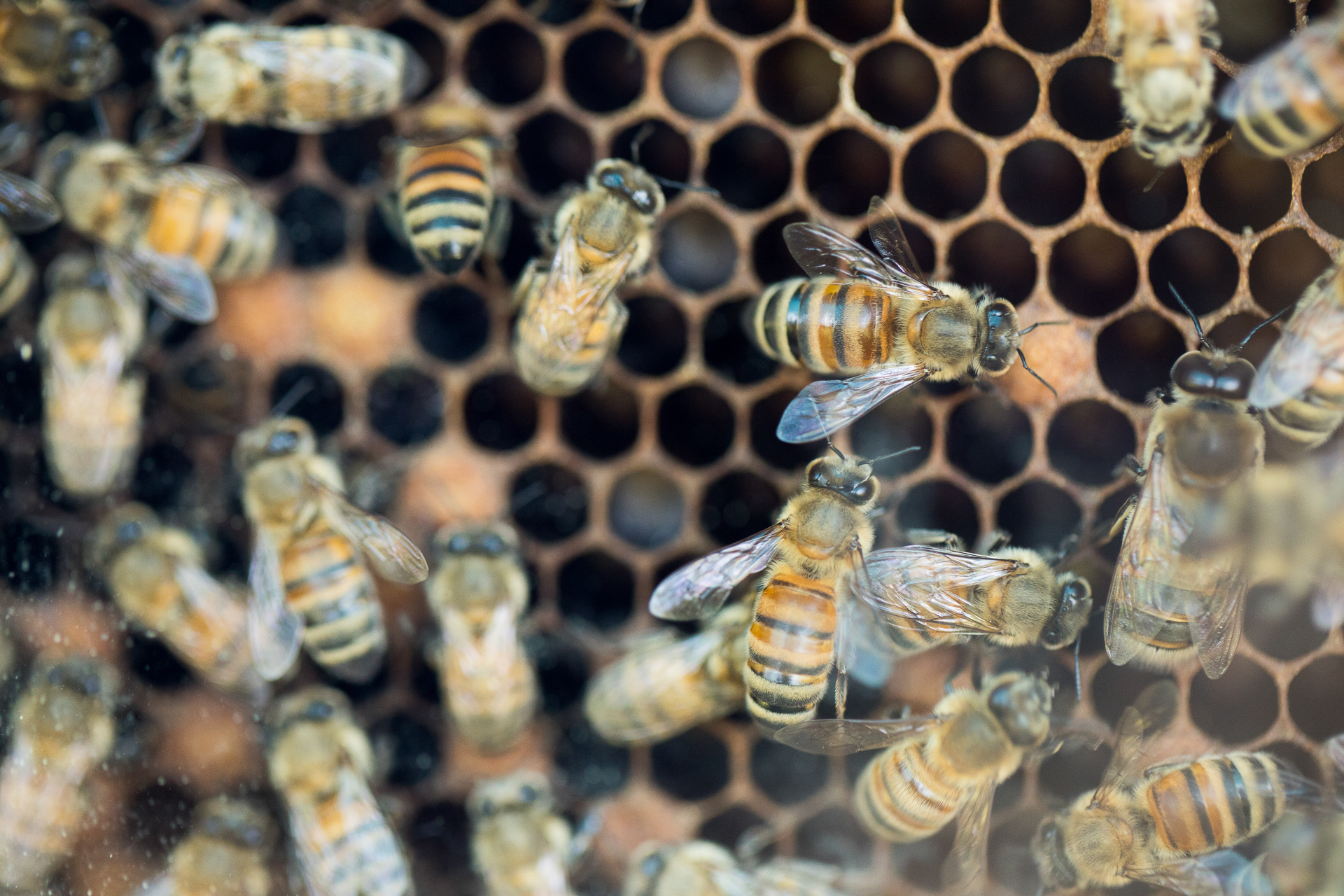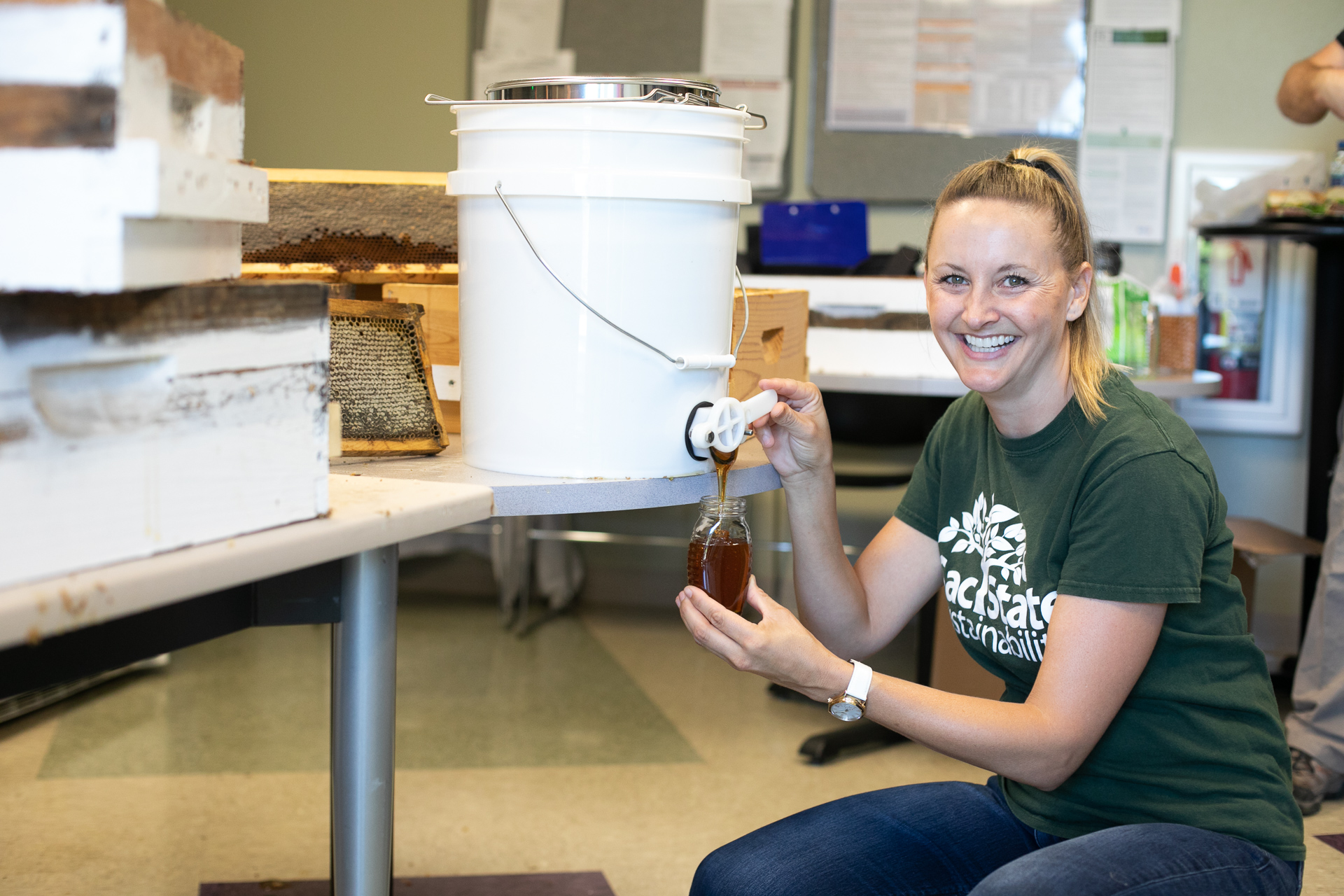Story Content
Bees open another door to recognition for Sac State's work toward sustainability

March 11, 2021
When wildfire smoke blanketed Northern California in November 2018 – leading to an unprecedented closure of the campus for more than a week – it was a difficult time for many, including honeybees in residence at Sac State’s Bioconversion and Agricultural Collaborative (BAC Yard).
“If the air is smoky, bees are unable to forage or communicate with their queen. They get disoriented and freak out,” said Kristina Cullen, sustainability and energy analyst for Sac State Sustainability.
So Cullen and a colleague ventured onto campus with concentrated pollen patties to feed thousands of bees unable to forage on their own.

That act is not why Sacramento State is the newest certified affiliate of Bee Campus USA, but it shows the University’s level of stewardship.
Bee Campus USA, an initiative of the Xerces Society for Invertebrate Conservation, honors Sac State’s commitment to conserving pollinators by increasing the abundance of native plants, providing nest sites, and reducing pesticide use.
This recognition adds to Sac State’s green credentials, dating to the University’s designation in 2012 as a Tree Campus USA, an honor bestowed by the Arbor Day Foundation. It also stands with the Garden for Wildlife certification given to Sac State by the National Wildlife Federation in 2020.
Only 111 college and universities nationally are Bee Campus USA affiliates. Sac State is one of 10 in California, with sister CSUs Cal Poly San Luis Obispo, CSU Channel Islands, and Cal State Northridge.
All three honors point to the University’s commitment to sustainability.
Across its 300 acres, Sac State boasts 3,714 trees that generally attract pollinators and are essential to a healthy natural environment. The oldest trees have been there for seven decades, and last year, an additional 250 saplings were planted across campus.
Grounds crews are busy this spring putting in a big blueberry patch near the existing bee-friendly almond grove and fruit orchards on the south edge of campus. This bit of urban agriculture is near the BAC Yard and Capital Public Radio’s garden, where Sac State Sustainability maintains 10 honeybee hives.
Minimizing pesticide usage is as important as providing pollinators’ feeding grounds. Crews still spray herbicides on the athletics fields to maintain the high-level surfaces required for collegiate competition. Elsewhere, however, crews are letting some “weeds” grow wild.
“We’re changing our philosophy around what constitutes a weed,” said Erik Skall, who manages the University’s Grounds and Landscape Services. “When a group of people recently spread wildflower seeds at the almond grove, it got me thinking: That’s actually a cover crop and a companion plant to the almonds, which you want to be pollinated.
“So I look around now, and instead of seeing weeds, I see greenery and opportunities to attract pollinators. In the past, those ‘weeds’ would have been sprayed multiple times a year.”
Bees remain in jeopardy, however.
Research has shown significant declines in the size and range of native pollinator populations across the globe, with up to 40% of pollinator species facing extinction because of habitat loss, use of harmful pesticides, and climate change, the Xerces Society says.
“When we’re losing bees at such an alarming rate, I think it’s important that we continue to plant native plants and reduce pesticides at our beautiful campus along the American River,” said Kristen Wonder, the University’s Waste and Sustainability coordinator.
“Getting the Bee Campus USA certification brings awareness to what Erik and his team are doing and holds us all accountable to continue.”
Watching a Sac State queen bee at work
Making, harvesting honey at Sac State
Media Resources
Faculty/Staff Resources
Looking for a Faculty Expert?
Contact University Communications
(916) 217-8366
communications@csus.edu